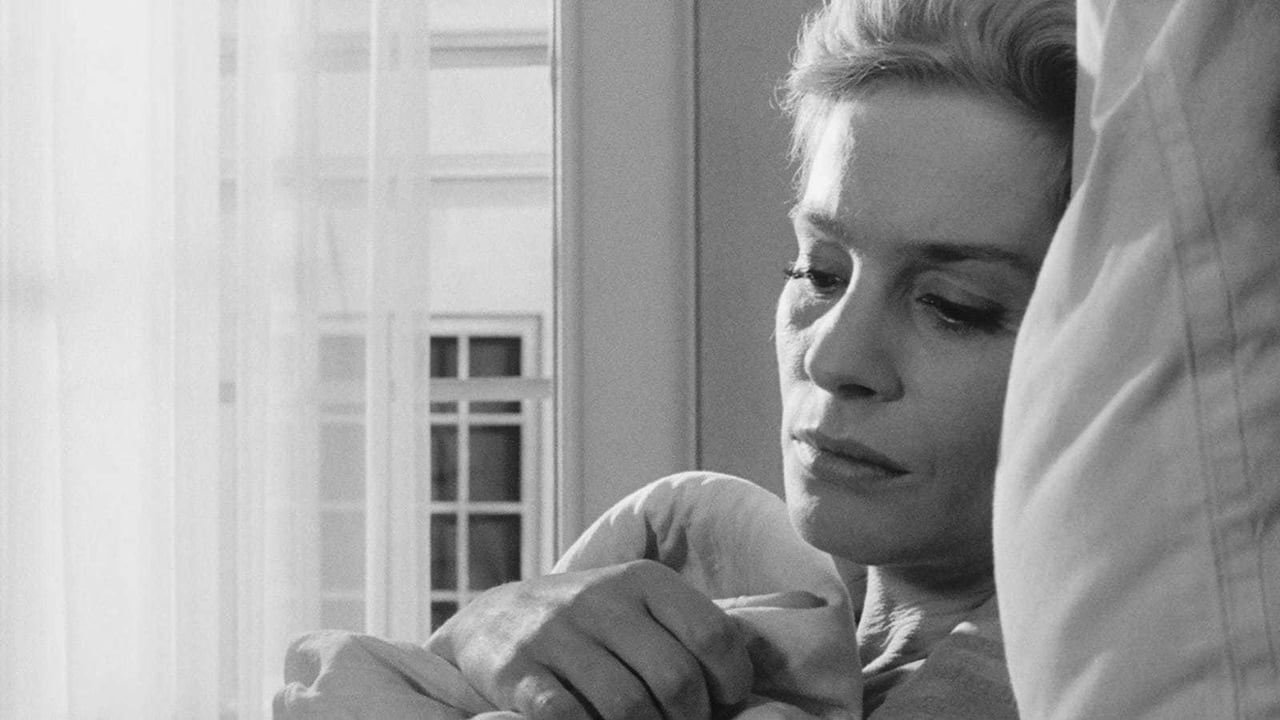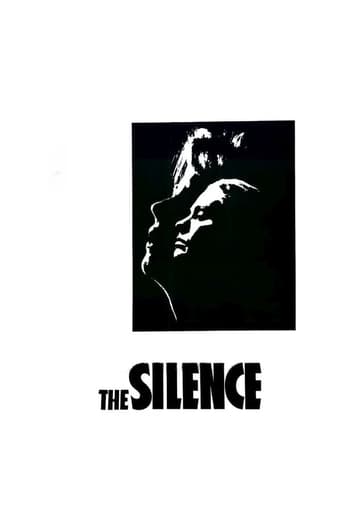

Although I write about the film, the following is more my musings/analyses than a review. I hope to begin a conversation about the film, thus I welcome your comments and thoughts.Beyond the obvious, the film also oozes with sexual connotations: Johan may have a budding foot fetish. The physical relationship between Anna and Johan is on the extreme edge of appropriateness or priggish comfort. The waiter drops Anna's change on the floor so he could get a look at her legs if not look up her dress. A painting with a satyr is depicted; satyrs are legend for a perpetual erection and their focus on sexual desires. Anna is sexually aroused upon observing the balcony couple having unrestrained sex.The feelings Ester expresses-particularly and outstandingly with her face-for her sister implies jealousy, un-requited love, vicariousness, envy, disgust, superiority, knowingness, sympathy, and betrayal. The mind games (per Eric Bern's "Games People Play") each plays to spite and manipulate the other are remarkable!Anna reads the local newspaper when we are to believe she does not know the local language; she also reads and orders from the menu. Interestingly, in the newspaper appears the name "J. S. Bach," which foreshadows the music and conversation we hear later in the film. The appearance of Bach's name in the newspaper reminds one of Alfred Hitchcock, who is widely known to appear candidly in his films including "Lifeboat," where he could appear only as a photograph in a newspaper.Initially, the train makes no sound nor movement, creating a dream-like state.I wonder how many times Johan has seen his mother go into and out of rooms with men.There is a stark absence of women in the film; one could count on a single hand the total number of women appearing in the film. If there were a war, there would instead be a stark absence of men.One user-reviewer wrote "a hotel located in an unnamed European country." The country is indeed stated as Timoka. We note too that the little people's tour trunk reads "Madrid" and one of them spoke Spanish.What is Ester's illness? Toward the end of the film, she identifies it-perhaps mockingly-as "euphoria." According to Wikipedia, "Euphoria is also a symptom of certain neurological or neuropsychiatric disorders, such as mania. Romantic love and components of the human sexual response cycle are also associated with the induction of euphoria." In Ester's case, I would tend toward the latter. One would die from neither, which suggests and explains Ester's over-dramatization and periods of apparent health. Such a performance (and her overnight collapse at the door of Anna's tryst-room) is another hand of Bern's "Games People Play."Much has been speculated about a lesbian relationship between the Ester and Anna. If it existed, the current relationship suggests it was one-way or even the exploitation of a younger sister by an older sister. If there is doubt of whether Ester is lesbian, it is addressed in her soliloquy beginning at 1:26, when she says (with no one to understand) "semen smells nasty to me . . . and I stank like a rotten fish when I was fertilized . . . . It's optional . . . . I didn't want to accept my wretched role . . . . but now it's too damn lonely," all of which could also be interpreted other ways.Ester makes a reference to "Uncle Persson," who is the fisherman in "Winter Light" and to whom Gunnel Lindblom's character (Karin) is married.
... View MoreIngmar Bergman has been one of my favorite filmmakers for quite some time. His films "Wild Strawberries" and "The Seventh Seal" were 2 of the first foreign films I'd ever seen, and they helped make me discover more international/art house films that I'd never heard of before.So, here comes "The Silence", a film that I finished watching about 5 minutes ago, and it is one of the most stunning films I've ever seen! It is weird, unsettling, and, at times, quite surreal. Bergman breaks taboos, and creates a film that is incredible in every way possible.The film is wonderful, unique scene after wonderful, unique scene. It doesn't really have much of a plot, but plot isn't always the most important part of a film. In some films, the plot is the most important element, but not here. Here, it is the direction, look, performances, atmosphere, and script.If you aren't a fan of Bergman, you obviously aren't going to enjoy the film, because it certainly looks and feels exactly like your average Bergman film, but it is somehow, even greater then your average Bergman film! Is it his best work? Not really, but, in my opinion, it is certainly one of his finest masterpieces!The film reminded me a lot of "Persona", they're both dark and unsettling looks at the relationship between two women, and are also equally strange and full of great atmosphere.I'm compelled to see this film again sometime soon, because, as you can tell, I absolutely loved it!
... View MoreIngmar Bergman made a trilogy, according to critics, later Bergman himself, and still later the Criterion Collection. The Silence (1963) is supposedly the last chapter of this trilogy which also includes Through a Glass Darkly (1961) and Winter Light (1963). They're all good films, but I question The Silence being linked with the others. It's possible to read The Silence as not having any particular relation to God, and there seems to be no direct reference to the Spider-God mentioned in the other two films and depicted on the Criterion DVD cover.Trilogy or no trilogy, The Silence is another solid film from Bergman. At first I found it kind of dull, as the two sisters Anna and Ester live with Anna's son Johan, with Ester being seriously ill. Not much seems to be happening to start with, there isn't much talking, and it seems a little strange when Johan goes into a room with several little people. At times it caught my attention with some open sexuality- the nudity (not quite as spectacular in black and white), the female masturbation, the sex in public. At any rate, the film eventually began to work for me, particularly with its conflict between the two sisters and the hints of lesbian incest. Anna is a sexual being, and her relationship with a strange man seems to be tearing Ester apart. With time, this film builds up undeniable atmosphere that ultimately wins me over. More people should see this film.
... View MoreThe Seventh Seal was an absolute masterpiece. After seeing it I thought, "Wow! I've GOT to see more Bergman!" I thought this because The Seventh Seal addressed struggles that are common to all of us; hope, faith & death. Yet at the same time it managed to address these with compelling characters that provided a glimpse both of the beauty of life and of the deep hardship. Seeing Winter Light was then, different. It offered only bleakness, which being new to Bergman I should have been prepared for but I still found the story moving as it showed the extent of this priest's depression.I see The Silence and what do I get? ... Nothing. I really can't think of anything eventful at all that happens in this movie. Common arguments I hear in favour of this movie is that "you are not supposed to relate to the characters. You're supposed to be shattered by their loneliness and their inability to communicate". Which is fine, just as long as something actually happened. I really cannot think of anything that happens in the movie and severely frustrated I fast-forwarded through the movie reading the subtitles so I could get this over with and not watch another Bergman film again any time soon.I was initially drawn to Bergman as he was reputedly one of the great artists of cinema and I was fed up with the same commercial rubbish that was being produced year after year. This movie goes too far in the other direction. People may say there is great merit in this movie for the issues it addresses or its daringness to address them at its time of release, but none of that matters if the movie is not entertaining and this just genuinely wasn't.We go to movies to be entertained.That's it. That comes first.Bringing in philosophical themes & broken relationships is fine, great in fact, as long as the movie is still entertaining. That's what The Seventh Seal did. I really don't know why people LOVE this movie so much. I can't understand why I've only read one other review with this sentiment.However, one of Bergman's quotes was that he couldn't understand why critics loved Citizen Kane so much when he thought it was so "immensely boring". I guess it goes to show how subjective these opinions of movies really are.
... View More